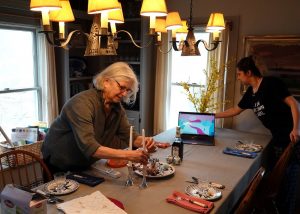
On Passover night, traditionally everyone sits with their loved ones at a festive table to read about freedom and the sufferings of slavery and plagues, and the desire for liberation. For a second consecutive year in the US, and most communities around the world, many will celebrate virtually since the pandemic is not behind us yet. So when we ask ourselves, “Ma nishtana?” (What has changed?), an inner reflection about what makes this night different from all others, we might need to scrutinize why we are still enduring painful situations and how we can be liberated from them once and for all.
Passover, from the Hebrew “Pesach,” means passage. It symbolizes the transition from the dominance of Pharaoh, our egoism, the exploitation of others for our own sake, into a state of love and bestowal when a new desire for positive social connection emerges. This desire is called “Moses,” from the word “moshech” (pulling), because he is the one who pulls Israel from exile, meaning from the controlling ego. In fact, the holiday of Passover describes an inner process of contradicting forces interacting with each other until the period of intensifying division eventually leads to a completely different approach of consideration for others.
Such a critically reflective period has been unleashed by the COVID-19 outbreak. It surged as a mirror to look at ourselves and discover how dependent we are on each other and how opposite we have been from the desirable state of mutual care. It indicates that we have nowhere to go, so we better sit down and do nothing but improve our relationships with those close to us—even if they are not in a physical proximity—and within society.
Why is this so important? It is essential because the root cause of every problem is our egoistic desire to enjoy only for ourselves in complete disregard of others. And if I care about others, it is only to the extent that it relates to me, that I depend on them. As a result of this approach, after such an extended period, we have not been able to create the necessary conditions to get out of the pandemic.
The Haggadah we recite during the traditional Seder table includes the phrase “we were slaves” of Pharaoh and couldn’t escape by ourselves. Today we are also enslaved to our evil inclination, which sparks disputes between us and creates lack of balance in all levels of nature, which causes illnesses, despair, and afflictions. The liberation from such a state is the true exit from Egypt, the exit from the control of our egoistic desires.
When will we be set free? When we are free of hatred and begin to feel that our health and good future hangs on the positive relationships between us. When we start thinking well of others, embrace them, and desire to benefit them. It is possible to achieve this goal if we ask the upper force, the Creator, to pull us out from Egypt with a strong but caring hand, and to pass us all over from a state of divisiveness, disregard, and coldness in modern society, to one of love, warmth, and cooperation.
I wish you all a happy Passover!
[Alice Swersey sets her dining room table for the first night of Passover with her granddaughter Amira Baigina, where the family will use a computer to connect with relatives who are unable to gather together due to the outbreak of Coronavirus disease (COVID-19) in Stephentown, New York, U.S., April 8, 2020. REUTERS/Bill Swersey]
#passover
Posted on Facebook, Jewish Boston, LinkedIn, The Times of Israel